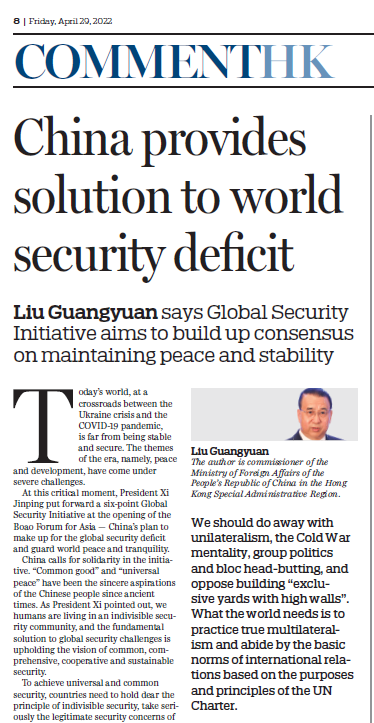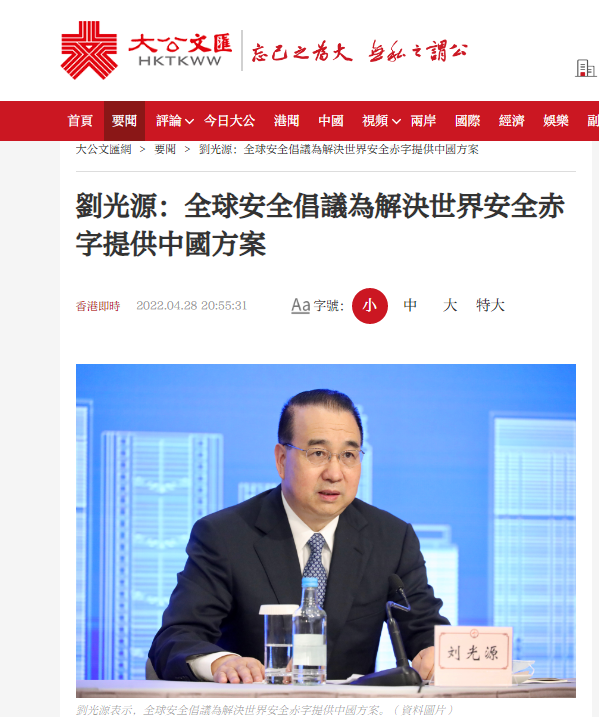2022年4月29日,外交部驻港公署刘光源特派员在《中国日报》发表题为《全球安全倡议为解决世界安全赤字提供中国方案》的英文署名文章,宣介习近平主席在博鳌亚洲论坛2022年年会开幕式上提出的全球安全倡议,指出倡议体现了“和衷共济”的中国情怀、“兼爱非攻”的中国格局和“统筹兼顾”的中国理念。文章介绍了中国为维护世界和平安全所做努力,并揭批个别国家在全球推行霸权主义和强权政治的恶劣本质。文章亦在大公文汇全媒体平台刊登中文版。全文如下:

当今世界不稳定不安全因素突出,人类还未走出疫情阴霾,乌克兰危机硝烟又起,和平与发展的时代主题面临严峻挑战。在此世界之变、时代之变、历史之变的关键时刻,习近平主席在博鳌亚洲论坛2022年年会开幕式上郑重提出全球安全倡议,以“六个坚持”为核心要义,为解决全球安全赤字开出中国方案,为维护世界和平安宁贡献中国智慧。
全球安全倡议体现“和衷共济”的中国情怀。世界大同、天下为公,是中国人民数千年来的真诚心愿。习近平主席指出,人类是不可分割的安全共同体。应对全球安全挑战的长久之道在于坚持共同、综合、合作、可持续的安全观。要秉持安全不可分割原则,重视彼此合理安全关切,构建均衡、有效、可持续的安全架构,从而实现普遍安全、共同安全。要坚持通过对话协商以和平方式解决国家间的分歧和争端,不能把自身“绝对安全”建立在别人的“绝对不安全”之上。要共同致力于降温灭火、维稳劝和,鼓励冲突各方以对话解决纷争,而不是通过滥用制裁、售武牟利等手段煽风拱火。
全球安全倡议体现“兼爱非攻”的中国格局。中国古语云,“大不攻小也,强不侮弱也,众不贼寡也。”任何国家,无论大小、强弱、贫富,都是国际社会的平等一员。历史和现实反复告诫我们,唯我独尊、以强凌弱是动荡之因,零和博弈、阵营对抗是战乱之由,丛林法则、强权逻辑是危险之源。21世纪不应再重演20世纪的悲剧。我们要坚决反对霸权主义和强权政治,反对干涉别国内政,坚持尊重各国主权、领土完整。要摒弃冷战思维,反对单边主义,不搞集团政治和阵营对抗。要践行真正的多边主义,反对小院高墙的排他主义,坚定维护以联合国宪章宗旨和原则为基础的国际关系基本准则。
全球安全倡议体现“统筹兼顾”的中国理念。全球安全倡议体系完整,内涵丰富,统筹维护传统领域和非传统领域安全,这是有效维护世界和平安宁的应有之义。当今各国利益密切交融,恐怖主义、气候变化、网络安全、难民危机、公共卫生等非传统安全问题呈现更多联动性、多样性、全球性,越来越成为人类面临的主要威胁和共同挑战。世界上没有哪个国家能独善其身,也没有哪个国家能通过甩锅推责解决自己的问题,各国必须精诚合作、携手应对,而非“脱钩断链”、打造“平行体系”。该倡议还与习近平主席去年提出的全球发展倡议相辅相成,兼顾安全与发展两大世界命题,共同呼应和平、发展、合作、共赢的时代潮流。
全球安全倡议以理念引导行动,以行动践行理念。作为负责任的大国,中国始终为维护世界和平与安全不懈努力。长期以来,中国积极参加联合国维和行动,是迄今安理会常任理事国中派遣维和人数最多的国家。在乌克兰问题上,中国立足是非曲直,恪守客观公正,积极劝和促谈。中国致力于弥合“免疫鸿沟”,迄已向国际社会提供超过21亿剂新冠肺炎疫苗。中国还积极引领全球气候治理进程,发起《全球数据安全倡议》,为应对非传统安全威胁贡献重要力量。
反观个别大国,为维护一己私利,热衷于以意识形态划线煽动对抗分裂,搞拉帮结派,不惜破坏国际秩序,将世界拖入“新冷战”的阴霾下。在乌克兰问题上,滥用单边制裁,不断拱火浇油,趁乱大发战争财。一些国家亦步亦趋,反而导致本国面临更大的安全危机和经济困难,结果害人害己。在向来和平发展的亚太区域,个别大国大肆贩卖所谓“印太战略”,企图造议题、搅混水,借军事同盟拼凑“亚太版北约”,把亚太地区推向分裂化、阵营化的危险局面。国际社会和地区国家应认清其霸权主义和强权政治本质,坚决保持高度警醒,坚持自主自立自强,维护和平团结合作,始终站在历史正确一边,站在国际公平正义一边。
不积跬步,无以至千里。中国愿同世界各国就全球安全倡议深入交流,凝聚共识,以实际举措回应时代之问,以具体行动推进倡议落地,为推动妥善解决各种国际和地区热点问题,建设持久和平和普遍安全的世界而不懈努力。

China provides solution to world security deficit
Today’s world, at a crossroads between the Ukraine crisis and the COVID-19 pandemic, is far from being stable and secure. The themes of the era, namely, peace and development, have come under severe challenges.
At this critical moment, President Xi Jinping put forward a six-point Global Security Initiative at the opening of the Boao Forum for Asia — China’s plan to make up for the global security deficit and guard world peace and tranquility.
China calls for solidarity in the initiative. “Common good” and “universal peace” have been the sincere aspirations of the Chinese people since ancient times. As President Xi pointed out, we humans are living in an indivisible security community, and the fundamental solution to global security challenges is upholding the vision of common, comprehensive, cooperative and sustainable security.
To achieve universal and common security, countries need to hold dear the principle of indivisible security, take seriously the legitimate security concerns of all others, and build a balanced, effective and sustainable security architecture.
Members of the global family must peacefully resolve differences and disputes through dialogue and consultation, and no one should pursue its own “absolute security” at the risk of cornering others into “absolute insecurity”.
The way out of crises is to encourage all parties to defuse tensions through dialogue, rather than fanning the flames by abusing sanctions and reaping profits from arms sales.
China advocates nonaggression in the initiative. As the old Chinese saying goes, “The big should not attack the small, the strong not insult the weak, and the majority not bully the minority.” This philosophy is as relevant as ever. Any country, big or small, strong or weak, rich or poor, is an equal member of the international community.
History has repeatedly warned us that a sense of superiority and the “might is right” thinking are the seeds of turmoil; zero-sum games and camp confrontation are the causes of war; and jungle laws and power logic are the roots of danger. The tragedy of the 20th century should by no means be repeated in the 21st century.
We must rail against hegemony and power politics, oppose interference in others’ internal affairs, respect the sovereignty and territorial integrity of all countries, and settle disagreements through talks.
We should do away with unilateralism, the Cold War mentality, group politics and bloc head-butting, and oppose building “exclusive yards with high walls”. What the world needs is to practice true multilateralism and abide by the basic norms of international relations based on the purposes and principles of the UN Charter.
China champions coordination in the initiative. The Global Security Initiative is a well-rounded, systematic proposal. It underscores the importance of both traditional and nontraditional security for a peaceful and stable world.
The interests of all countries are closely entwined. Various nontraditional security issues such as terrorism, climate change, cybersecurity, refugee crisis and public health, emerging as the main threats facing all mankind, have led the world to an interconnected security dynamics that has global impact.
No country can stay immune from the spillover effects or fix its problems by blame-shifting. Countries must rise up to challenges hand in hand, rather than decoupling from others or building a “parallel system”.
The security initiative and the Global Development Initiative proposed by President Xi last year are the two driving wheels of a vehicle. Setting sight on both security and development issues, they have echoed the global call for peace, development, cooperation and mutual benefit.
China has put the ideals in the Global Security Initiative into actions. As a responsible major country, we have made sustained efforts to defend world peace and security. Over the decades, China has actively participated in UN peacekeeping operations and has so far sent the largest number of peacekeepers among the permanent members of the Security Council.
On the Ukraine issue, China upholds integrity and impartiality, makes its own judgment based on the merit of the matter, and promotes peace talks.
To bridge the immunization gap, we have provided over 2.1 billion doses of vaccines to the international community. What’s more, China has made crucial contributions to other nontraditional security threats by spearheading efforts on global climate governance and launching the Global Initiative on Data Security.
By contrast, a certain major power, to serve self-interest, is keen to incite division, disrupt the international order, and drag the world into a “new Cold War” by drawing ideological lines and engaging in group politics.
On Ukraine, it poured oil on the fire by imposing unilateral sanctions and made a fortune out of the war. Some countries followed suit but turned out to face greater security and economic difficulties. The result benefits no one.
To make matters worse, that country has been peddling an “Indo-Pacific strategy” in the Asia-Pacific, a region that values peaceful development, in an attempt to turn the Asia-Pacific into another NATO consisting of military blocs.
The whole world and all regional countries must see through the hegemonic and power politics nature of that strategy, stay highly vigilant and self-independent, safeguard peace, unity and cooperation together, and stand on the right side of history and the right side of international fairness and justice.
Small steps get us to faraway places. China will continue with in-depth exchanges with other countries and build up consensus on the Global Security Initiative. We will double down efforts to translate the visions in the initiative into reality, respond to the calls of the times with concrete actions, and work for proper settlement of regional and international hot spots for a world of lasting peace and universal security.